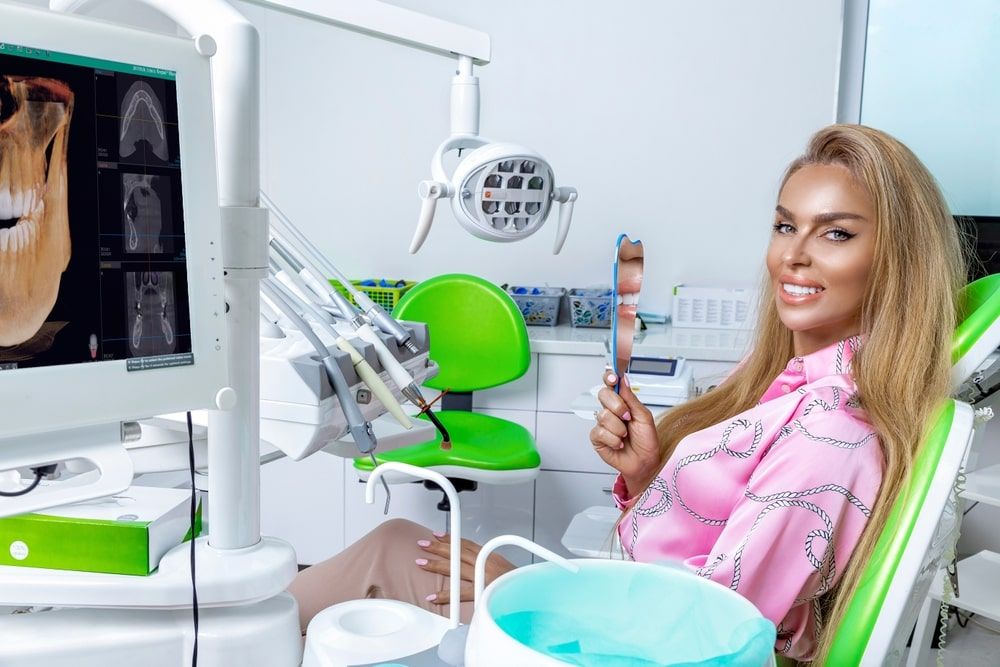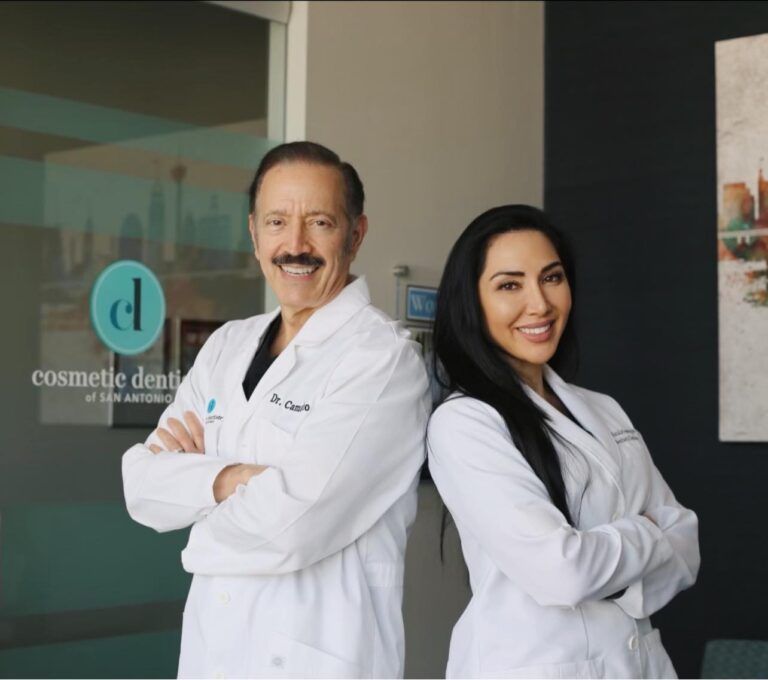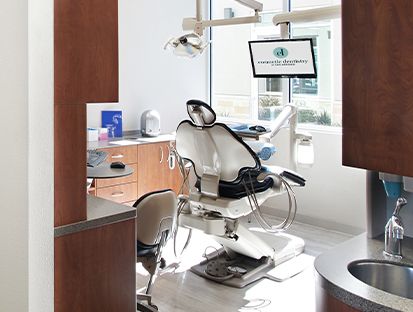Porcelain veneers are a popular cosmetic dentistry solution that can dramatically enhance your smile by covering imperfections such as discoloration, chips, and gaps. While veneers are known for their durability and natural appearance, proper care is essential to ensure they remain beautiful and functional for years to come. This blog will provide you with a comprehensive guide on how to care for your porcelain veneers, helping you maintain their stunning look and maximize their lifespan. Whether you’re new to veneers or looking to improve your maintenance routine, these tips will help you keep your smile in top shape.
In This Blog:
- Understanding Porcelain Veneers
- Daily Oral Hygiene Routine
- Dietary Considerations
- Preventing Damage
- Handling Emergencies
- Long-Term Maintenance
Understanding Porcelain Veneers
Porcelain veneers are thin, custom-made shells crafted from high-quality dental porcelain designed to cover the front surface of your teeth. They are bonded to your natural teeth to enhance their appearance, offering a highly effective solution for various cosmetic dental issues.
Benefits of Porcelain Veneers
Porcelain veneers provide numerous benefits, making them a popular choice for those looking to improve their smile. These benefits include:
- Natural Appearance: The translucent properties of porcelain mimic the light-reflecting qualities of natural teeth, giving veneers a realistic and aesthetically pleasing look.
- Stain Resistance: Porcelain is highly resistant to staining from foods, beverages, and smoking, allowing veneers to maintain their bright appearance over time.
- Durability: With proper care, porcelain veneers can last for many years, providing a long-lasting solution for cosmetic dental improvements.
- Minimal Invasiveness: The process of applying veneers is less invasive compared to other restorative procedures, preserving more of your natural tooth structure.
Common Reasons for Getting Porcelain Veneers
People opt for porcelain veneers for various cosmetic reasons, including:
- Discoloration: Veneers can cover teeth that are severely stained or discolored and resistant to traditional whitening methods.
- Chipped or Broken Teeth: Veneers can restore the appearance of teeth that have been chipped or broken, providing a uniform look.
- Gaps Between Teeth: Veneers can close small gaps between teeth, creating a more aligned and aesthetically pleasing smile.
- Misaligned or Irregularly Shaped Teeth: Veneers can improve the appearance of teeth that are slightly misaligned, uneven, or irregularly shaped, giving you a more harmonious smile.
By understanding what porcelain veneers are, their benefits, and the common reasons for choosing them, you can better appreciate the importance of proper care to maintain their beauty and functionality.
Daily Oral Hygiene Routine
Importance of Brushing and Flossing
Maintaining a consistent oral hygiene routine is crucial for the longevity of your porcelain veneers. Regular brushing and flossing help remove plaque and prevent gum disease, which can compromise the bond between your veneers and natural teeth.
Recommended Toothpaste and Toothbrush Types
When caring for porcelain veneers, choose a non-abrasive toothpaste to avoid scratching the surface of the veneers. Whitening toothpastes and those with baking soda should be avoided as they can be too harsh. Opt for a soft-bristled toothbrush to gently clean your teeth and veneers without causing damage.
Proper Flossing Techniques to Avoid Damaging Veneers
Flossing daily is essential for removing plaque and food particles between your teeth and along the gumline. Use a gentle sawing motion to avoid snapping the floss against your veneers, which could dislodge or damage them. Consider using a water flosser for a thorough yet gentle cleaning.
Mouthwash: Is It Necessary? What Type to Use?
While mouthwash is not essential, it can be a beneficial addition to your oral hygiene routine. Choose an alcohol-free mouthwash to prevent drying out your mouth and irritating your gums. An antibacterial mouthwash can help reduce plaque and maintain overall oral health.
Dietary Considerations
Foods and Drinks to Avoid
Certain foods and drinks can pose a risk to your porcelain veneers. Avoid biting into hard foods like ice, nuts, or hard candies, as they can chip or crack your veneers. Be cautious with staining beverages such as coffee, tea, red wine, and soda. Although porcelain veneers are stain-resistant, the natural teeth around them are not, which can lead to uneven coloring over time.
Tips for Minimizing Potential Damage
When consuming hard or staining foods, consider cutting them into smaller pieces to reduce the risk of damaging your veneers. Drinking staining beverages through a straw can help minimize contact with your teeth. Additionally, rinsing your mouth with water after consuming such foods and drinks can help reduce their impact.
Hydration and Its Impact on Oral Health
Staying hydrated is important for maintaining a healthy mouth and veneers. Drinking plenty of water helps wash away food particles and bacteria, reducing the risk of plaque buildup and gum disease. It also helps keep your mouth moist, which is essential for overall oral health.
By following a diligent daily oral hygiene routine and making mindful dietary choices, you can protect your porcelain veneers and keep them looking their best for years to come.
Preventing Damage
Avoiding Habits That Can Harm Veneers
Certain habits can significantly increase the risk of damaging your porcelain veneers. To keep your veneers in optimal condition, avoid:
- Nail Biting: Biting your nails can cause stress on your veneers, leading to chips or cracks.
- Chewing on Pens or Pencils: Similar to nail biting, chewing on hard objects can damage your veneers.
- Using Teeth as Tools: Never use your teeth to open packages or bottles, as this can apply undue pressure and cause your veneers to break.
- Teeth Grinding (Bruxism): Grinding your teeth can wear down and damage your veneers over time.
The Importance of Using a Mouthguard for Bruxism
If you grind your teeth at night, it’s essential to use a custom-fitted mouthguard to protect your veneers. A mouthguard acts as a barrier, absorbing the pressure and preventing damage to both your veneers and natural teeth. Consult your dentist for a professionally made mouthguard that fits comfortably and provides effective protection.
Regular Dental Check-ups and Professional Cleanings
Routine dental visits are crucial for maintaining the health of your veneers and natural teeth. Schedule regular check-ups and cleanings with your dentist to ensure your veneers are intact and your oral health is in good condition. Professional cleanings help remove plaque and tartar buildup that can affect the longevity of your veneers.
Handling Emergencies
What to Do If a Veneer Chips or Falls Off
Accidents can happen, and if a veneer chips or falls off, it’s important to know how to handle the situation. If your veneer is damaged or dislodged, follow these steps:
- Protect the Veneer: If the veneer is intact, store it in a safe place and avoid touching the area with your tongue or fingers.
- Contact Your Dentist: Call your dentist immediately to schedule an appointment. Explain the situation and seek advice on any temporary measures you should take.
- Avoid Using the Affected Tooth: Refrain from chewing or biting with the tooth that has the damaged or missing veneer to prevent further damage.
Temporary Solutions Until a Dental Appointment
If you cannot see your dentist right away, there are a few temporary solutions you can consider:
- Over-the-Counter Dental Cement: Available at most pharmacies, dental cement can temporarily reattach a dislodged veneer. Follow the instructions carefully and consult your dentist as soon as possible.
- Orthodontic Wax: Apply orthodontic wax to the rough edges of a chipped veneer to protect your tongue and cheek from irritation.
Importance of Seeing a Dentist as Soon as Possible
Prompt attention from your dentist is crucial to address any issues with your veneers. Delaying treatment can lead to further damage or complications, so it’s important to seek professional care as soon as you notice a problem.
By avoiding harmful habits, protecting your veneers from damage, and knowing how to handle emergencies, you can ensure the longevity and effectiveness of your porcelain veneers. Regular dental visits and proper care will help keep your smile beautiful and healthy.
Long-Term Maintenance
Regular Dental Visits and Their Frequency
Consistent dental check-ups are essential for monitoring the condition of your veneers and maintaining your overall oral health. Schedule dental visits at least twice a year, or more frequently if recommended by your dentist. These visits allow your dentist to detect any potential issues early and provide necessary treatments to prevent damage.
Professional Cleanings and Their Role in Veneer Maintenance
Professional dental cleanings help remove plaque and tartar buildup that regular brushing and flossing may miss. During these cleanings, your dentist or dental hygienist will use specialized tools to clean around your veneers and natural teeth, ensuring a thorough cleaning that helps maintain the integrity and appearance of your veneers.
Potential Need for Veneer Replacement Over Time
While porcelain veneers are durable, they may eventually need to be replaced due to normal wear and tear. The lifespan of veneers typically ranges from 10 to 15 years, depending on how well they are cared for. Regular dental check-ups allow your dentist to monitor the condition of your veneers and determine when replacement is necessary to maintain your smile’s aesthetics and functionality.
Conclusion
Proper care and maintenance are crucial for preserving the beauty and longevity of your porcelain veneers. By following a diligent oral hygiene routine, making mindful dietary choices, and avoiding habits that can harm your veneers, you can keep your smile looking stunning for years to come. Regular dental visits and professional cleanings further ensure that your veneers remain in excellent condition, while knowing how to handle emergencies helps you address any issues promptly. With these tips, you can confidently enjoy the benefits of your porcelain veneers and maintain a radiant, healthy smile.
Dr. Edward Camacho earned his DDS from the University of Texas Health Science Center. He believes in continuing his education and training and that a dentist’s education should never cease. As a result, he has received extensive training in aesthetic dentistry, restorative dentistry, dental implant placement, orthodontics, computerized dentistry, and laser dentistry. Dr. Camacho’s continued education and completed cosmetic procedures has helped him establish himself as one of San Antonio’s leading cosmetic dentists. He has completed thousands of cosmetic procedures over the span of his 40 year career.







